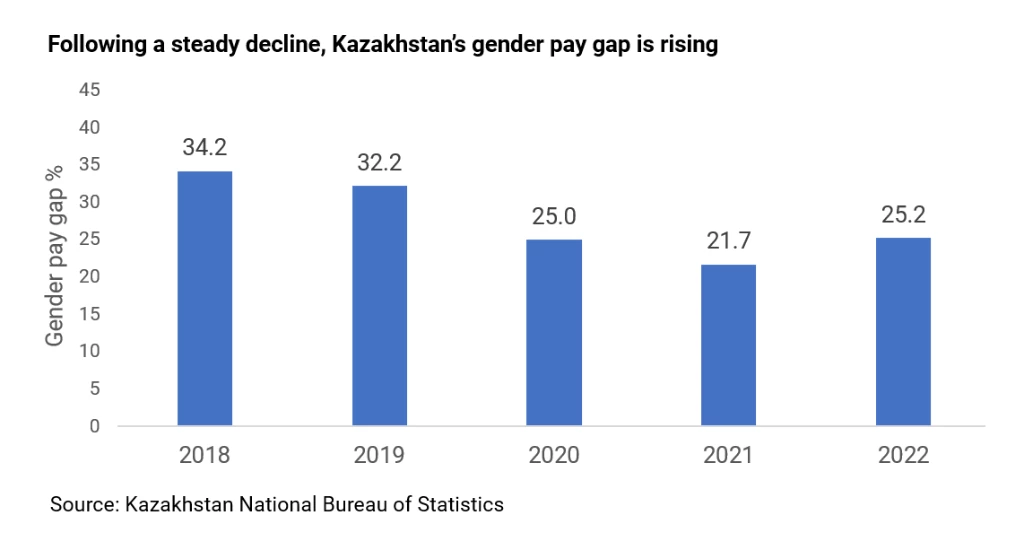 Workers at a machinery assembly plant in Kazakhstan making printed circuit boards. Copyright: Turar Kazangapov/World Bank
Workers at a machinery assembly plant in Kazakhstan making printed circuit boards. Copyright: Turar Kazangapov/World Bank
Women’s economic and financial empowerment are critical for economic growth around the globe, and Kazakhstan is no exception. Having women engaged in meaningful jobs is beneficial for the economy, good for their families, and has advantages for wider communities.
However, women face many barriers to realizing their full economic potential. On International Women’s Day, we take stock of women’s economic empowerment in Kazakhstan. As an upper middle-income country and the largest economy in Central Asia, increasing women’s economic empowerment in Kazakhstan can help to propel the country to high-income status and yield wider benefits for the region.
But where does Kazakhstan stand and what is needed to make this vision a reality?
1. In Kazakhstan, more men participate in the labor force than women, but the gap is not as wide as other upper middle-income countries.
The proportion of the population aged 15 and above that is economically active was 65 percent among women and 75 percent among men in 2022. Since the 1990s, this figure has remained roughly the same for women. However, the gap between economically active men and women is smaller in Kazakhstan than the average for other upper middle-income countries and high-income countries.
2. Although having a job is important, what also matters is the type of work undertaken, and here Kazakhstan presents a mixed picture.
On the one hand, nearly three in four specialized professionals are women. However, of all unskilled workers, almost 55 percent are women. And unpaid domestic work, which is critical for the wellbeing of families but remains overlooked and uncounted, is dominated by women, who spend three times as much time on unpaid domestic and care work than men.
3. Despite progress, Kazakhstan has a gender pay gap, where women earn less than men in almost all occupations.
Unfortunately, no country in the world has successfully closed the gender pay gap, and such a gap usually widens when women become mothers. Kazakhstan was making progress in closing the gender gap, which fell from 34 percent in 2018 to 21 percent in 2021. However, the aftermath of the COVID-19 pandemic saw the gender pay gap creep up to 25 percent in 2022. The government’s recent initiative to raise the minimum wage can help to reduce pay gaps for lower paid occupations, but more efforts are needed to focus on this issue for all types of occupations.
4. Can education be leveraged to bolster women’s economic empowerment?
At the level of secondary education, Kazakhstan has achieved gender parity. And more women are enrolled in higher education than men, at 65 percent and 54 percent respectively. Given the supply of female graduates, there could be an opportunity to turn the tables and increase the number of women in high paying jobs. However, to leverage the power of education, broader efforts are needed to enhance the quality of the education system and reduce the skills deficit, as discussed in the World Bank’s Public Finance Review.
5. Women’s leadership is critical for economic empowerment, and this is where Kazakhstan falls short.
While there has been progress over the last 15 years, in Kazakhstan women hold 27 percent of seats in parliament, which is below the OECD average of 33 percent. Only 31 percent of firms have some type of female participation in ownership, falling far short of the OECD average of 40 percent. Female leaders can develop more profitable companies, influence policy decisions, and serve as role models for future generations.
So, what is the bottom line and where can Kazakhstan go next?
The overall picture is mixed. While Kazakhstan has more women in the workplace than similar countries, who are strongly engaged in professional positions, the likelihood is that they are paid less, and they are less likely to be in leadership positions. Education combined with supportive social norms and affordable childcare are important for closing gender gaps, provided the quality of the education system improves and skills match the demand of employers in a more knowledge-based economy of the future.
Policy and institutional changes can have a tremendous impact. The recently launched Women, Business and the Law Report 2024 assesses the extent to which legal frameworks support women’s economic inclusion and empowerment for all countries. This year, a new scoring methodology assesses how effectively legal frameworks are implemented, known as the “supportive framework.” Kazakhstan achieved a score of 70.0 for legal frameworks (the same as the Philippines, Tajikistan, and Bolivia) and a score of 62.5 for supportive frameworks (the same as Colombia and Belize).
By strengthening legal frameworks for entrepreneurship, Kazakhstan could go a long way in reducing gender gaps identified in the Women, Business and Law report. Unlike high-income countries such as South Korea and several European countries, in Kazakhstan there are no laws which prohibit discrimination in access to credit based on gender, there is no gender quota for boards of directors, and there are no gender sensitive procurement provisions. Furthermore, Kazakhstan lacks transparency measures on pay and relevant enforcement mechanisms to address the pay gap. In addition, there is no specialized body to receive harassment-related complaints and there is a lack of guidelines on non-discrimination in the workplace.
The World Bank is committed to reducing gender gaps so that women from all walks of life can realize their potential. Reducing gender gaps matters from an economic empowerment dimension as well as from a fairness and justice perspective. This year, the World Bank will be launching a WB Gender Strategy 2024-30 and we plan to start a new Gender Assessment for Central Asia. We hope that you will join us in promoting women’s economic empowerment in Kazakhstan and globally, not just on International Women’s Day, but through conscious and concerted efforts which require action from each of us, every day.
To receive weekly articles, sign-up here





Join the Conversation